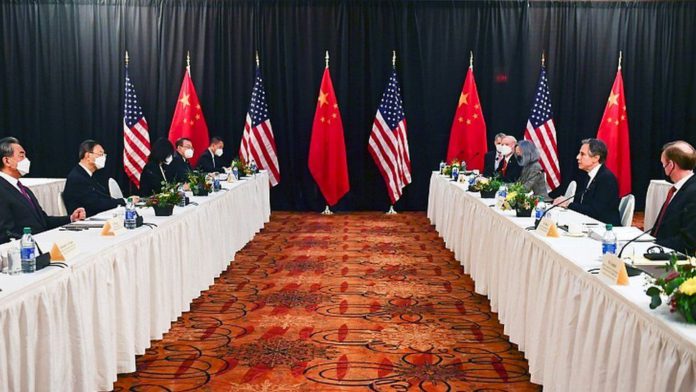United States (US) and Chinese officials have exchanged sharp rebukes in the first high-level talks between the Biden administration and China, taking place in Alaska.
Chinese officials accused the US of inciting countries “to attack China”, while the US said China had “arrived intent on grandstanding”.
Relations between the two superpowers are at their most strained for years.
The US pledged to raise contentious issues such as Beijing’s treatment of Uighur Muslims in Xinjiang.
The ill-tempered talks in Anchorage involved Secretary of State Antony Blinken and National Security Adviser Jake Sullivan on the US side, facing off with China’s most senior foreign policy official, Yang Jiechi, and foreign minister Wang Yi.
However, a US official said the subsequent talks behind closed doors had been “substantive, serious and direct” and ran over the planned two hours.
In a blunt opening statement before the talks in private, Mr Blinken said the US would “discuss our deep concerns with actions by China, including in Xinjiang, Hong Kong, Taiwan, cyber attacks on the United States, economic coercion of our allies”.
“Each of these actions threaten the rules-based order that maintains global stability,” he said.
In response, Mr Yang accused Washington of using its military might and financial supremacy to suppress other countries.
“It abuses so-called notions of national security to obstruct normal trade exchanges, and incite some countries to attack China,” he added.
Mr Yang said human rights in the US were at a low point, with black Americans being “slaughtered”.
Mr Sullivan hit back, saying Washington did not seek a conflict with China, but added: “We will always stand up for our principles for our people, and for our friends.”
The exchange, which took place in front of the world’s media, went on for more than an hour. It came at the start of three sessions, which are due to end on Friday morning.
MORE:
It is the first high-level meeting between the US and China since last June – during the administration of the previous US President, Donald Trump.
Afterwards, the US delegation accused China of violating the agreed protocol of two minutes of opening remarks by each side.
“The Chinese delegation… seems to have arrived intent on grandstanding, focused on public theatrics and dramatics over substance,” a senior administration official said.
The official said the US would continue with the talks as planned, adding that “exaggerated diplomatic presentations often are aimed at a domestic audience”.
In later remarks via state media, Chinese officials said it had been the US, not China, that had violated protocol by exceeding the agreed time in opening remarks. They accused the US of making a “groundless attack on China’s domestic and foreign policies”.
On a more positive note, it quoted Mr Yang as saying that “serious difficulties in China-US relations in the past should not continue”.
The BBC’s Barbara Plett Usher says the talks are the first chance for the Biden administration to show how it intends to deal with what Mr Blinken has called “the biggest geopolitical test of the 21st Century”.
China is looking for a reset after relations hit rock bottom under the Trump administration, our correspondent adds. Mr Wang has said that Beijing is ready to reopen “constructive dialogue.”
What do China and the US disagree about?
Quite a lot.
Trade for instance. The US accuses China of unfair practices, such as subsidising industries, stealing intellectual property, keeping its currency low and putting up barriers to trade.
For its part, China wants the big trade tariffs introduced by the Trump administration on Chinese goods eliminated. It also accuses the US of “suppressing” successful Chinese tech companies, such as Huawei.
Human rights and democracy. The US accuses China of genocide against the Uighur population in the province of Xinjiang, and trampling on democratic rights in Hong Kong with a recently introduced security law.
But China calls on the US to stop interfering in what Beijing considers its internal affairs and accuses the US of “smearing” the ruling Communist Party.
China is also pushing back against what it sees as US naval encroachment in the South China Sea, which Beijing considers Chinese territory.

